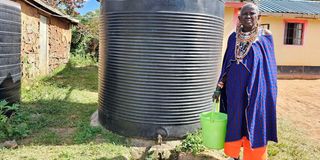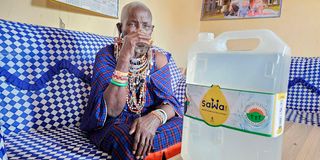The matriarch of Maendeleo ya Wanawake: Emily Oluma's six-decade fight for women's progress

Emily Teresia Oluma stands next to a 5,000-litre water tank she received from Maendeleo ya Wanawake, at her compound in Bisil, Kajiado County, on February 24, 2025.
What you need to know:
- Emily Oluma, born in 1938 during Kenya's colonial era, overcame being married off young without education to become a pioneering member of Maendeleo ya Wanawake.
- She purchased land for her children, ensured they received education she was denied, and now questions why current leaders aren't investing in women's empowerment like during the Kenyatta and Moi eras.
Emily Teresia Oluma has lived through generations and witnessed the sun rise over many hills and set over vast plains in Kenya’s political landscape and socio-economic growth.
She had just turned 18 when affluent white women from East Africa, comprising Kenya, Uganda, and Tanganyika (now Tanzania), established the Maendeleo ya Wanawake Organisation in 1956, to reach out to African women and provide them with social welfare.
Born and raised in Kajiado Oldonyo Orok in Kajiado Central, Emily never had the opportunity to go to school.
At the time of her birth in 1938, Kenya was still under the grip of Great Britain, and the colonialists focussed on educating boys, offering them technical education that primarily benefitted their masters, mostly preparing them for clerical jobs.
While missionaries attempted to fill the educational gap for girls, their training was limited to preparing them to be wives and homemakers. They were taught to excel in cooking, housekeeping, hygiene, childcare, weaving, sewing, and other handicraft skills, rather than acquiring technical skills that might lead to well-paid jobs like their men counterparts.
Emily became a victim of the colonial system. The culture and colonial order had already dictated their destiny: born to be wives and nothing more.
Consequently, her father married her off to a “very old” man in the neighbouring village of Lesoiti when she was “so young”. She became his second wife.
By the time Kenya gained independence in 1963, Emily was 25 years old and already burdened with caring for her children. Looking after her husband's livestock and her 12 children was an overwhelming responsibility for such a young woman; some of her children have since passed away.
“But I managed. What else was I supposed to do?” she reflects, recalling the harsh realities of her life at that time.
However, she has fond memories of the era of the founding President Jomo Kenyatta, who led the Republic of Kenya from 1964 until he died in 1978.
“During his time, the councillors were approachable, and they mobilised women to form groups to improve their livelihoods. They even contributed to the women’s groups and connected them to markets to sell their products,” she recalls.
During that time, she joined Maendeleo ya Wanawake. The organisation had its first African chairperson, Phoebe Asiyo, elected in 1959.
Phoebe encouraged women to unite and focus on vital issues, identifying agriculture, food security, and family planning as key areas.
Emily formed a group that concentrated on purchasing bull calves, fattening them, and selling them for profit.
“We then invested the money in beadwork projects, sold our crafts in Nairobi, and re-invested the earnings into table banking. We would subsequently offer loans to help one another develop, including paying school fees for our children and investing in our businesses,” she narrates.
This growth continued during President Daniel Moi’s tenure, which lasted from 1978 to 2002, allowing them to prosper from their enterprises.
Emily highlights a notable aspect of the Kenyatta and Moi eras: the support men provided to their wives.
“Men would accompany us to Nairobi to deliver and sell our goods. They sourced materials for our beadwork and supported our efforts,” she explains.
However, after Moi's tenure, she observed a troubling change.
“Women were left to fend for themselves. Now, it's women who are fighting for their rights. The support from men has diminished. Men seem to have drifted away, leaving women to immerse themselves more in activities promoting economic empowerment,” she expresses concern.
Interestingly, it was during Moi’s regime that Kenya saw the appointment of its first woman Cabinet Minister for Culture and Social Services-Winfred Nyiva Mwendwa, appointed by President Moi in 1992.

Emily drinks water from the water-purification jerrican at her house in Bisil, Kajiado County, on February 24, 2025.
This marked a historic moment for Kenya. Moi’s era also served as a pivotal time in Kenya’s history, as women attended the Fourth World Conference on Women in Beijing, China, returning home with the now-famous Beijing Declaration and Platform for Action, which outlined strategies to empower women and achieve global gender equality.
Although Emily is not acquainted with this global policy document, she is acutely aware of the economic independence she has built over the years, her resilience in overcoming the challenges posed by climate change, the barriers she has dismantled for her daughters to access education, the hard work she has invested to escape poverty, and her efforts to shield her daughters from harmful cultural practices.
Equipped with her savings and revolving income through the women’s group, Emily purchased land for herself and each of her children in the peri-urban area of Bisil, Kajiado Central. She also invested in livestock for her retirement.
Together, as a group registered with Maendeleo ya Wanawake, they constructed a Maendeleo House in the Bisil market centre. However, following the deaths of some members, the children demanded their shares, leading to the sale of the house and division of the proceeds.
Today, Emily is one of the four surviving founding members of the group and one of Maendeleo ya Wanawake's longest-serving members.
She has benefited from a water-harvesting and purification project run by Maendeleo ya Wanawake, which involved distributing 5,000-litre water tanks and a six-litre jerrican that purifies water using sunlight.
The Sawa jerrican, distributed in partnership with 4Life Solutions, a Danish company, purifies water in four hours by harnessing UV rays and heat to eliminate harmful pathogens. However, the purified water in the jerrican is only consumable for three days.
“Maendeleo ya Wanawake provided me with a 5,000-litre tank, and I was motivated to purchase an additional 3,000-litre tank. Now, if it's empty, I can buy water from water bowsers to refill it, which can last me three months when I’m alone and two months when I’m with my children and grandchildren,” she explains.
Previously, they had to fetch water from far away, which was a daily and exhausting journey, she says.
Now, she enjoys undisturbed sleep. Not only does she live in a cool concrete house that alleviates the discomfort of the hot climate in Bisil, which is synonymous with the mud manyatta huts, but she also no longer needs to make a trip to the kitchen to fetch drinking water.
“I keep the jerrican by my bedside along with a glass. If I need water, I simply pour it and drink without leaving my bed,” she says.
Emily has educated all her children, except her eldest daughter, through college.
She recounts how her husband forbade her from attending school. He passed away, granting her the autonomy to make educational decisions for her children.
“I didn't allow any of my daughters to marry early. I ensured they received an education to empower them,” she states.
Now, all her surviving children are either employed or running their businesses.
Yet, one thing troubles her regarding women's empowerment: “Current leaders are not investing in women like those in Kenyatta’s and Moi’s times. I don’t know what happened.”
As Kenya’s government and civil society take pride in the progress made towards advancing empowerment and gender equality over the past three decades, Emily’s question lingers: “What will the leadership do differently in the next three decades and beyond?”
This feature is part of our special coverage for International Women's Day, celebrated globally on March 8, to honour women's achievements and continue the push for gender equality.

